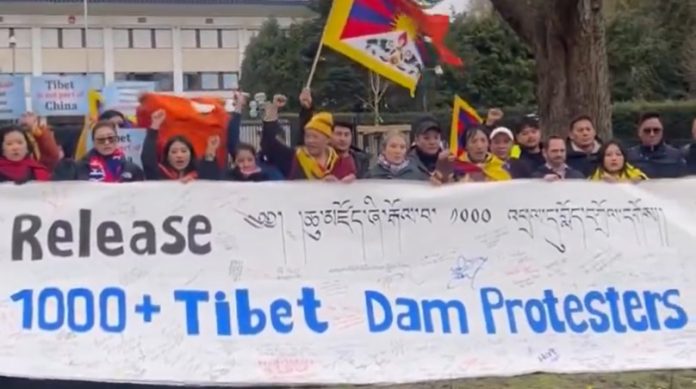After a massive crackdown on the peaceful protestors agitating against the construction of dam on Drichu River, a solidarity protest has been organised across the world. The solidarity protest called for the immediate release of over 1000 Buddhist monks and other civilians along with stopping the construction the Gangtuo hydropower station on the Drichu River. Notably, people in Dege County, part of the Garze Tibetan Autonomous Prefecture were on the streets since February 14th against the construction of a massive 13-tier hydropower complex with a planned capacity of 13,920 megawatts on Drichu river.
Ramifications of project
The controversial dam construction project has prompted widespread resistance from local residents, including monks, in this historically Tibetan region, now administered as part of China’s Sichuan province since the Chinese occupation of the region. The dam’s construction threatens to force the relocation of two villages, Upper Wonto and Shipa, inhabited by around 2,000 Tibetans. Additionally, it poses a significant threat to the existence of six historic monasteries, namely Wonto Monastery, Yena Monastery, Khardho Monastery, Rabten Monastery, Gonsar Monastery, and Tashi Monastery. These monasteries house invaluable Buddhist relics, including ancient murals dating back to the 13th century at Wonto Monastery.
Disturbing reports indicate that Chinese police attacked and injured multiple protestors on February 23. As of now, more than 1,000 Tibetans have been arrested in connection with the protests. Many are reportedly being held in a police station in Upper Wonto, with additional detainees kept in an old prison in Dege County and various other facilities throughout the county.
China’s response to the protests has, as usual, been brutal and inhumane and has escalated tensions. Concerns have also been raised about the conditions in detention centers, where the detained protestors have been kept, with reports suggesting inadequate food supply leading to some detainees passing out due to scarcity of food.
Tibetan Parliament-in-Exile condemns attack
Meanwhile, the Tibetan Parliament-in-Exile has also issued a powerful condemnation of the brutal crackdown on Tibetans who have been arrested following a peaceful protest. The Tibetan Parliament-in-Exile called for the immediate release of detainees, a halt to dam construction, and respect for the wishes of local people regarding any projects in the region.
Moreover, in Dege county, COVID-19-like restrictions have been imposed, accompanied by the deployment of large police forces in areas where Tibetans are being held. Each police unit brought in from outside Dege has been assigned to control a specific community, enforcing strict surveillance and suppression measures. Communities such as Wonto and Yena are reportedly facing restrictions, with residents prohibited from leaving their homes.
The situation raises pressing concerns about the state of human rights and press freedom in the affected areas, prompting the international community to closely monitor developments.

